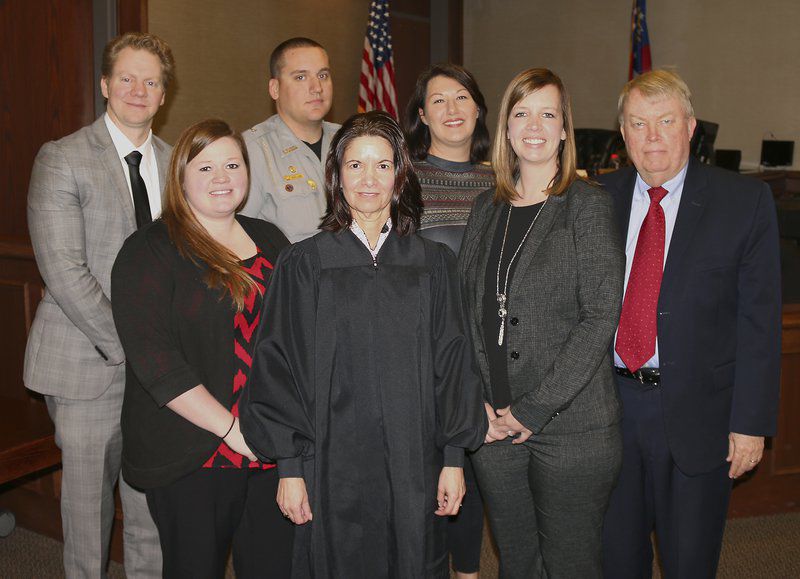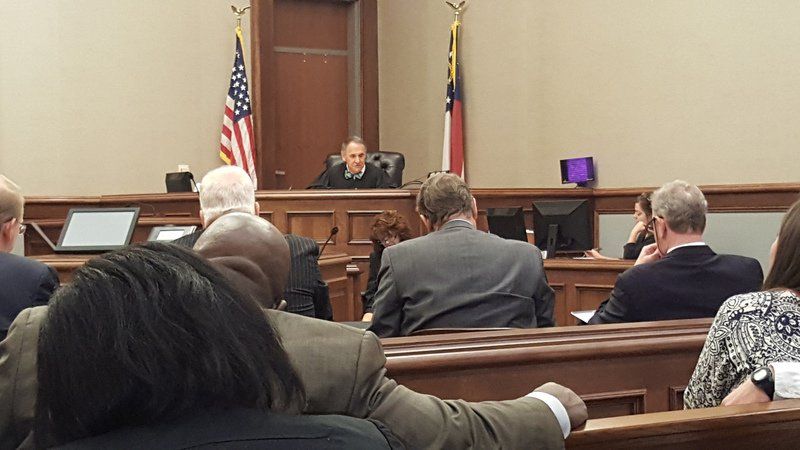New DUI Court to help habitual offenders
Published 9:30 am Tuesday, January 10, 2017

- Derrek Vaughn | The Valdosta Daily TimesThe members of the Lowndes County DUI Court: Probation Officer Kayla Porter, Judge Ellen Golden, Court Cooridnator Stacey Bass, Defense Attorney Richard Shelton, Assistant Solicitor-General Matthew P. Brown, Deputy Jared Davis and treatment provider Laci Rankhorn
EDITOR’S NOTE: Lowndes County introduced two accountability courts last week. Tuesday, The Valdosta Daily Times looks at the DUI Accountability Court. Wednesday, The Times looks at the Parental Accountability Court.
VALDOSTA — At the Lowndes County Judicial Complex in court room 4C, the DUI Court held its inaugural session.
The court is a voluntary, post-conviction, treatment-based program for residents with multiple offenses for DUIs, according to information provided by Lowndes County officials.
Participants will receive supervision from the courts, counseling and treatment. The program is expected to last 12 months, but a 24-month sentence is mandatory in case there are any setbacks for the participants.
Lowndes County Commission Chairman Bill Slaughter said he hopes the DUI Court will help residents in the program and save taxpayers money.
“If the accountability courts will reduce the prison population size … it will help taxpayers save money by not increasing the (county) expenditure,” Slaughter said.
He said the court is a way to help residents who are being “chased by parole officers” understand their problems and get their lives back on track.
The court will have a team of individuals who will work with participants to help them receive substance-abuse treatment and counseling and monitor their progress.
“This is a team effort,” State Court Judge Ellen Golden said.
The team includes Golden, Assistant Solicitor-General Matthew Brown, Defense Attorney Richard Shelton, Court Coordinator Stacey Bass, Probation Officer Kayla Porter, Treatment Provider Laci Rankhorn and Lowndes County Deputy Jared Davis.
Each team member will fulfill specific roles that are defined for the participants of the court.
To be eligible for the DUI Court, an applicant must be charged with at least two DUIs in the last five years, or his or her third DUI in his or her lifetime, have sufficient charges for a 24-month sentencing, be a resident of Lowndes County, be 17 years of age or older, show an indication of alcohol or drug abuse or dependence, have no history of violent felonies or sexual offenses, have no out-of-state warrants and, if applicable, have a valid immigration status with no holds.
The DUI court is not free for the participants and any extra required counseling must be paid by the participant.
Participants are required to pay a one-time $100 participation fee, $50 for the initial enrollment, a $50 weekly fee for treatment and a $54 monthly probationary fee, according to county information.
If a participant tests positive for a drug test while in the program and challenges it, the participant will be required to pay for the results if the independent testing facility confirms the positive result.
The DUI court has an orientation period and four phases, according to the handbook participants are required to read.
The orientation includes the sentencing, initial meeting with the probation officer, a drug screening, a risk assessment and the development of a treatment plan.
Phases one though four require group sessions, individual counseling sessions, community support meetings, status conferences and reporting to a probation officer. The amount of sessions and meetings required per month depends on where a participant is in the program. Some meetings increase while others decrease.
Accepted community support groups include Alcoholics Anonymous, Narcotics Anonymous and other similar programs.
Church groups, life groups, MADD, volunteer activities and wellness meetings do not count as community support groups, according to officials.
Participants who fail to comply with the program or relapse may be punished by reading an apology letter in court, community-service hours, jail time and expulsion from the DUI Court, according to the DUI court sanction matrix.
Participants can be reprimanded for small infractions such as being late to court, missing a session, failure to pay, tampering with drug screening, curfew violations and association with individuals who are using drugs or alcohol in the participant’s presence.
During the first session, the judge asked each participant if he or she had read through the handbook, completed the orientation for the program, started counseling and treatment, if he or she understood the financial, personal and mental commitment he or she was making to be a part of the new DUI Court program and personal questions relating to each participant including the participant’s prescription medications and job status.
The DUI court is “awkward” for the participants, but it is helping them “come to realize that they have a problem,” Golden said.
Golden will not receive extra pay and will be making time to work with the DUI Court.
“This is something the judges are making the time and sacrifices to do,” said Lowndes County Clerk Paige Dukes, who is also the county’s public information officer.
Along with the court meetings, Golden and the team will have an hour-long meeting prior to court sessions to discuss the progress of the participants.
By the end of the year, Golden said she expects to have 25 participants in the new court and will be able to hold up to 50 participants.
“Honestly, if the courts are working (the numbers) should decrease,” Golden said.
Jason Smith is a reporter at The Valdosta Daily Times. He can be contacted at 229-244-3400 ext.1256.





